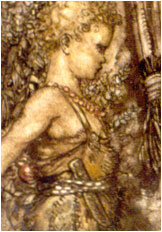|
The Perfect Wagnerite:
A Commentary on the Niblung's Ring
by Bernard Shaw
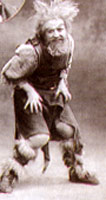 Sieglinda, when she flies into the forest with the hero's son
unborn in her womb, and the broken pieces of his sword in her
hand, finds shelter in the smithy of a dwarf, where she brings
forth her child and dies. This dwarf is no other than Mimmy, the
brother of Alberic, the same who made for him the magic helmet.
His aim in life is to gain possession of the helmet, the ring,
and the treasure, and through them to obtain that Plutonic
mastery of the world under the beginnings of which he himself
writhed during Alberic's brief reign. Mimmy is a blinking,
shambling, ancient creature, too weak and timid to dream of
taking arms himself to despoil Fafnir, who still, transformed to
a monstrous serpent, broods on the gold in a hole in the rocks.
Mimmy needs the help of a hero for that; and he has craft enough
to know that it is quite possible, and indeed much in the
ordinary way of the world, for senile avarice and craft to set
youth and bravery to work to win empire for it. He knows the
pedigree of the child left on his hands, and nurses it to manhood
with great care.
Sieglinda, when she flies into the forest with the hero's son
unborn in her womb, and the broken pieces of his sword in her
hand, finds shelter in the smithy of a dwarf, where she brings
forth her child and dies. This dwarf is no other than Mimmy, the
brother of Alberic, the same who made for him the magic helmet.
His aim in life is to gain possession of the helmet, the ring,
and the treasure, and through them to obtain that Plutonic
mastery of the world under the beginnings of which he himself
writhed during Alberic's brief reign. Mimmy is a blinking,
shambling, ancient creature, too weak and timid to dream of
taking arms himself to despoil Fafnir, who still, transformed to
a monstrous serpent, broods on the gold in a hole in the rocks.
Mimmy needs the help of a hero for that; and he has craft enough
to know that it is quite possible, and indeed much in the
ordinary way of the world, for senile avarice and craft to set
youth and bravery to work to win empire for it. He knows the
pedigree of the child left on his hands, and nurses it to manhood
with great care.
His pains are too well rewarded for his comfort. The boy
Siegfried, having no god to instruct him in the art of
unhappiness, inherits none of his father's ill luck, and all his
father's hardihood. The fear against which Siegmund set his face
like flint, and the woe which he wore down, are unknown to the
son. The father was faithful and grateful: the son knows no law
but his own humor; detests the ugly dwarf ho has nursed him;
chafes furiously under his claims some return for his tender
care; and is, in short, a totally unmoral person, a born
anarchist, the ideal of Bakoonin, an anticipation of the
"overman" of Nietzsche. He is enormously strong, full of life and
fun, dangerous and destructive to what he dislikes, and
affectionate to what he likes; so that it is fortunate that his
likes and dislikes are sane and healthy. Altogether an
inspiriting young forester, a son of the morning, in whom the
heroic race has come out into the sunshine from the clouds of his
grandfather's majestic entanglements with law, and the night of
his father's tragic struggle with it.
The First Act
Mimmy's smithy is a cave, in which he hides from the light like
the eyeless fish of the American caverns. Before the curtain
rises the music already tells us that we are groping in darkness.
When it does rise Mimmy is in difficulties. He is trying to make
a sword for his nursling, who is now big enough to take the field
against Fafnir. Mimmy can make mischievous swords; but it is not
with dwarf made weapons that heroic man will hew the way of his
own will through religions and governments and plutocracies and
all the other devices of the kingdom of the fears of the
unheroic. As fast as Mimmy makes swords, Siegfried Bakoonin
smashes them, and then takes the poor old swordsmith by the
scruff of the neck and chastises him wrathfully. The particular
day on which the curtain rises begins with one of these trying
domestic incidents. Mimmy has just done his best with a new sword
of surpassing excellence. Siegfried returns home in rare spirits
with a wild bear, to the extreme terror of the wretched dwarf.
When the bear is dismissed, the new sword is produced. It is
promptly smashed, as usual, with, also, the usual effects on the
temper of Siegfried, who is quite boundless in his criticisms of
the smith's boasted skill, and declares that he would smash the
sword's maker too if he were not too disgusting to be handled.
Mimmy falls back on his stock defence: a string of maudlin
reminders of the care with which he has nursed the little boy
into manhood. Siegfried replies candidly that the strangest thing
about all this care is that instead of making him grateful, it
inspires him with a lively desire to wring the dwarf's neck.
Only, he admits that he always comes back to his Mimmy, though he
loathes him more than any living thing in the forest. On this
admission the dwarf attempts to build a theory of filial
instinct. He explains that he is Siegfried's father, and that
this is why Siegfried cannot do without him. But Siegfried has
learned from his forest companions, the birds and foxes and
wolves, that mothers as well as fathers go to the making of
children. Mimmy, on the desperate ground that man is neither bird
nor fox, declares that he is Siegfried's father and mother both.
He is promptly denounced as a filthy liar, because the birds and
foxes are exactly like their parents, whereas Siegfried, having
often watched his own image in the water, can testify that he is
no more like Mimmy than a toad is like a trout. Then, to place
the conversation on a plane of entire frankness, he throttles
Mimmy until he is speechless. When the dwarf recovers, he is so
daunted that he tells Siegfried the truth about his birth, and
for testimony thereof produces the pieces of the sword that broke
upon Wotan's spear. Siegfried instantly orders him to repair the
sword on pain of an unmerciful thrashing, and rushes off into the
forest, rejoicing in the discovery that he is no kin of Mimmy's,
and need have no more to do with him when the sword is mended.
Poor Mimmy is now in a worse plight than ever; for he has long
ago found that the sword utterly defies his skill: the steel will
yield neither to his hammer nor to his furnace. Just then there
walks into his cave a Wanderer, in a blue mantle, spear in hand,
with one eye concealed by the brim of his wide hat. Mimmy, not by
nature hospitable, tries to drive him away; but the Wanderer
announces himself as a wise man, who can tell his host, in
emergency, what it most concerns him to know. Mimmy, taking this
offer in high dudgeon, because it implies that his visitor's wits
are better than his own, offers to tell the wise one something
that HE does not know: to wit, the way to the door. The
imperturbable Wanderer's reply is to sit down and challenge the
dwarf to a trial of wit. He wagers his head against Mimmy's that
he will answer any three questions the dwarf can put to him.
Now here were Mimmy's opportunity, had he only the wit to ask
what he wants to know, instead of pretending to know everything
already. It is above all things needful to him at this moment to
find out how that sword can be mended; and there has just dropped
in upon him in his need the one person who can tell him. In such
circumstances a wise man would hasten to show to his visitor his
three deepest ignorances, and ask him to dispel them. The dwarf,
being a crafty fool, desiring only to detect ignorance in his
guest, asks him for information on the three points on which he
is proudest of being thoroughly well instructed himself. His
three questions are, Who dwell under the earth? Who dwell on the
earth? and Who dwell in the cloudy heights above? The Wanderer,
in reply, tells him of the dwarfs and of Alberic; of the earth,
and the giants Fasolt and Fafnir; of the gods and of Wotan:
himself, as Mimmy now recognizes with awe.
Next, it is Mimmy's turn to face three questions. What is that
race, dearest to Wotan, against which Wotan has nevertheless done
his worst? Mimmy can answer that: he knows the Volsungs, the race
of heroes born of Wotan's infidelities to Fricka, and can tell
the Wanderer the whole story of the twins and their son
Siegfried. Wotan compliments him on his knowledge, and asks
further with what sword Siegfried will slay Fafnir? Mimmy can
answer that too: he has the whole history of the sword at his
fingers' ends. Wotan hails him as the knowingest of the knowing,
and then hurls at him the question he should himself have asked:
Who will mend the sword? Mimmy, his head forfeited, confesses
with loud lamentations that he cannot answer. The Wanderer reads
him an appropriate little lecture on the folly of being too
clever to ask what he wants to know, and informs him that a smith
to whom fear is unknown will mend Nothung. To this smith he
leaves the forfeited head of his host, and wanders off into the
forest. Then Mimmy's nerves give way completely. He shakes like a
man in delirium tremens, and has a horrible nightmare, in the
supreme convulsion of which Siegfried, returning from the forest,
presently finds him.
A curious and amusing conversation follows. Siegfried himself
does not know fear, and is impatient to acquire it as an
accomplishment. Mimmy is all fear: the world for him is a
phantasmagoria of terrors. It is not that he is afraid of being
eaten by bears in the forest, or of burning his fingers in the
forge fire. A lively objection to being destroyed or maimed does
not make a man a coward: on the contrary, it is the beginning of
a brave man's wisdom. But in Mimmy, fear is not the effect of
danger: it is natural quality of him which no security can allay.
He is like many a poor newspaper editor, who dares not print the
truth, however simple, even when it is obvious to himself and all
his readers. Not that anything unpleasant would happen to him if
he did--not, indeed that he could fail to become a distinguished
and influential leader of opinion by fearlessly pursuing such a
course, but solely because he lives in a world of imaginary
terrors, rooted in a modest and gentlemanly mistrust of his own
strength and worth, and consequently of the value of his opinion.
Just so is Mimmy afraid of anything that can do him any good,
especially of the light and the fresh air. He is also convinced
that anybody who is not sufficiently steeped in fear to be
constantly on his guard, must perish immediately on his first
sally into the world. To preserve Siegfried for the enterprise to
which he has destined him he makes a grotesque attempt to teach
him fear. He appeals to his experience of the terrors of the
forest, of its dark places, of its threatening noises its
stealthy ambushes, its sinister flickering lights its
heart-tightening ecstasies of dread.
All this has no other effect than to fill Siegfried with wonder
and curiosity; for the forest is a place of delight for him. He
is as eager to experience Mimmy's terrors as a schoolboy to feel
what an electric shock is like. Then Mimmy has the happy idea of
describing Fafnir to him as a likely person to give him an
exemplary fright. Siegfried jumps at the idea, and, since Mimmy
cannot mend the sword for him, proposes to set to work then and
there to mend it for himself. Mimmy shakes his head, and bids him
see now how his youthful laziness and frowardness have found him
out--how he would not learn the smith's craft from Professor
Mimmy, and therefore does not know how even to begin mending the
sword. Siegfried Bakoonin's retort is simple and crushing. He
points out that the net result of Mimmy's academic skill is that
he can neither make a decent sword himself nor even set one to
rights when it is damaged. Reckless of the remonstrances of the
scandalized professor, he seizes a file, and in a few moments
utterly destroys the fragments of the sword by rasping them into
a heap of steel filings. Then he puts the filings into a
crucible; buries it in the coals; and sets to at the bellows with
the shouting exultation of the anarchist who destroys only to
clear the ground for creation. When the steel is melted he runs
it into a mould; and lo! a sword-blade in the rough. Mimmy,
amazed at the success of this violation of all the rules of his
craft, hails Siegfried as the mightiest of smiths, professing
himself barely worthy to be his cook and scullion; and forthwith
proceeds to poison some soup for him so that he may murder him
safely when Fafnir is slain. Meanwhile Siegfned forges and
tempers and hammers and rivets, uproariously singing the while as
nonsensically as the Rhine maidens themselves. Finally he assails
the anvil on which Mimmy's swords have been shattered, and
cleaves it with a mighty stroke of the newly forged Nothung.
The Second Act
In the darkest hour before the dawn of that night, we find
ourselves before the cave of Fafnir, and there we find Alberic,
who can find nothing better to do with himself than to watch the
haunt of the dragon, and eat his heart out in vain longing for
the gold and the ring. The wretched Fafnir, once an honest giant,
can only make himself terrible enough to keep his gold by
remaining a venomous reptile. Why he should not become an honest
giant again and clear out of his cavern, leaving the gold and the
ring and the rest of it for anyone fool enough to take them at
such a price, is the first question that would occur to anyone
except a civilized man, who would be too accustomed to that sort
of mania to be at all surprised at it.
To Alberic in the night comes the Wanderer, whom the dwarf,
recognizing his despoiler of old, abuses as a shameless thief,
taunting him with the helpless way in which all his boasted power
is tied up with the laws and bargains recorded on the heft of his
spear, which, says Alberic truly, would crumble like chaff in his
hands if he dared use it for his own real ends. Wotan, having
already had to kill his own son with it, knows that very well;
but it troubles him no more; for he is now at last rising to
abhorrence of his own artificial power, and looking to the coming
hero, not for its consolidation but its destruction. When Alberic
breaks out again with his still unquenched hope of one day
destroying the gods and ruling the world through the ring, Wotan
is no longer shocked. He tells Alberic that Brother Mime
approaches with a hero whom Godhead can neither help nor hinder.
Alberic may try his luck against him without disturbance from
Valhalla. Perhaps, he suggests, if Alberic warns Fafnir, and
offers to deal with the hero for him, Fafnir, may give him the
ring. They accordingly wake up the dragon, who condescends to
enter into bellowing conversation, but is proof against their
proposition, strong in the magic of property. "I have and hold,"
he says: "leave me to sleep." Wotan, with a wise laugh, turns to
Alberic. "That shot missed," he says: "no use abusing me for it.
And now let me tell you one thing. All things happen according to
their nature; and you can't alter them." And so he leaves him
Alberic, raging with the sense that his old enemy has been
laughing at him, and yet prophetically convinced that the last
word will not be with the god, hides himself as the day breaks,
and his brother approaches with Siegfried.
Mimmy makes a final attempt to frighten Siegfried by discoursing
of the dragon's terrible jaws, poisonous breath, corrosive
spittle, and deadly, stinging tail. Siegfried is not interested
in the tail: he wants to know whether the dragon has a heart,
being confident of his ability to stick Nothung into it if it
exists. Reassured on this point, he drives Mimmy away, and
stretches himself under the trees, listening to the morning
chatter of the birds. One of them has a great deal to say to him;
but he cannot understand it; and after vainly trying to carry on
the conversation with a reed which he cuts, he takes to
entertaining the bird with tunes on his horn, asking it to send
him a loving mate such as all the other creatures of the forest
have. His tunes wake up the dragon; and Siegfried makes merry
over the grim mate the bird has sent him. Fafnir is highly
scandalized by the irreverence of the young Bakoonin. He loses
his temper; fights; and is forthwith slain, to his own great
astonishment.
In such conflicts one learns to interpret the messages of Nature
a little. When Siegfried, stung by the dragon's vitriolic blood,
pops his finger into his mouth and tastes it, he understands what
the bird is saying to him, and, instructed by it concerning the
treasures within his reach, goes into the cave to secure the
gold, the ring and the wishing cap. Then Mimmy returns, and is
confronted by Alberic. The two quarrel furiously over the sharing
of the booty they have not yet secured, until Siegfried comes
from the cave with the ring and the helmet, not much impressed by
the heap of gold, and disappointed because he has not yet learned
to fear.
He has, however, learnt to read the thoughts of such a creature
as poor Mimmy, who, intending to overwhelm him with flattery and
fondness, only succeeds in making such a self-revelation of
murderous envy that Siegfried smites him with Nothung and slays
him, to the keen satisfaction of the hidden Alberic. Caring
nothing for the gold, which he leaves to the care of the slain;
disappointed in his fancy for learning fear; and longing for a
mate, he casts himself wearily down, and again appeals to his
friend the bird, who tells him of a woman sleeping on a mountain
peak within a fortress of fire that only the fearless can
penetrate. Siegfried is up in a moment with all the tumult of
spring in his veins, and follows the flight of the bird as it
pilots him to the fiery mountain.
The Third Act
To the root of the mountain comes also the Wanderer, now nearing
his doom. He calls up the First Mother from the depths of the
earth, and begs counsel from her. She bids him confer with the
Norns (the Fates). But they are of no use to him: what he seeks
is some foreknowledge of the way of the Will in its perpetual
strife with these helpless Fates who can only spin the net of
circumstance and environment round the feet of men. Why not, says
Erda then, go to the daughter I bore you, and take counsel with
her? He has to explain how he has cut himself off from her, and
set the fires of Loki between the world and her counsel. In that
case the First Mother cannot help him: such a separation is part
of the bewilderment that is ever the first outcome of her eternal
work of thrusting the life energy of the world to higher and
higher organization. She can show him no way of escape from the
destruction he foresees. Then from the innermost of him breaks
the confession that he rejoices in his doom, and now himself
exults in passing away with all his ordinances and alliances,
with the spear-sceptre which he has only wielded on condition of
slaying his dearest children with it, with the kingdom, the power
and the glory which will never again boast themselves as "world
without end." And so he dismisses Erda to her sleep in the heart
of the earth as the forest bird draws near, piloting the slain
son's son to his goal.
Now it is an excellent thing to triumph in the victory of the new
order and the passing away of the old; but if you happen to be
part of the old order yourself, you must none the less fight for
your life. It seems hardly possible that the British army at the
battle of Waterloo did not include at least one Englishman
intelligent enough to hope, for the sake of his country and
humanity, that Napoleon might defeat the allied sovereigns; but
such an Englishman would kill a French cuirassier rather than be
killed by him just as energetically as the silliest soldier, ever
encouraged by people who ought to know better, to call his
ignorance, ferocity and folly, patriotism and duty. Outworn life
may have become mere error; but it still claims the right to die
a natural death, and will raise its hand against the millennium
itself in self-defence if it tries to come by the short cut of
murder. Wotan finds this out when he comes face to face with
Siegfried, who is brought to a standstill at the foot of the
mountain by the disappearance of the bird. Meeting the Wanderer
there, he asks him the way to the mountain where a woman sleeps
surrounded by fire. The Wanderer questions him, and extracts his
story from him, breaking into fatherly delight when Siegfried,
describing the mending of the sword remarks, that all he knew
about the business was that the broken bits of Nothung would be
of no use to him unless he made a new sword out of them right
over again from the beginning. But the Wanderer's interest is by
no means reciprocated by Siegfried. His majesty and elderly
dignity are thrown away on the young anarchist, who, unwilling to
waste time talking, bluntly bids him either show him the way to
the mountain, or else "shut his muzzle." Wotan is a little hurt.
"Patience, my lad," he says: "if you were an old man I should
treat you with respect." "That would be a precious notion," says
Siegfried. "All my life long I was bothered and hampered by an
old man until I swept him out of my way. I will sweep you in the
same fashion if you don't let me pass. Why do you wear such a big
hat; and what has happened to one of your eyes? Was it knocked
out by somebody whose way you obstructed?" To which Wotan replies
allegorically that the eye that is gone--the eye that his
marriage with Fricka cost him--is now looking at him out of
Siegfried's head. At this, Siegfried gives up the Wanderer as a
lunatic, and renews his threats of personal violence. Then Wotan
throws off the mask of the Wanderer; uplifts the world-governing
spear; and puts forth all his divine awe and grandeur as the
guardian of the mountain, round the crest of which the fires of
Loki now break into a red background for the majesty of the god.
But all this is lost on Siegfried Bakoonin. "Aha!" he cries, as
the spear is levelled against his breast: "I have found my
father's foe"; and the spear falls in two pieces under the stroke
of Nothung. "Up then," says Wotan: "I cannot withhold you," and
disappears forever from the eye of man. The fires roll down the
mountain; but Siegfried goes at them as exultantly as he went at
the forging of the sword or the heart of the dragon, and
shoulders his way through them, joyously sounding his horn to the
accompaniment of their crackling and seething. And never a hair
of his head is singed. Those frightful flames which have scared
mankind for centuries from the Truth, have not heat enough in
them to make a child shut its eyes. They are mere phantasmagoria,
highly creditable to Loki's imaginative stage-management; but
nothing ever has perished or will perish eternally in them except
the Churches which nave been so poor and faithless as to trade
for their power on the lies of a romancer.
SYNOPSIS
In his cavern workshop near Fafner's lair, Mime complains bitterly as he toils at an anvil to forge a new sword for Siegfried, who has grown to manhood. The impotent, hate-filled Nibelung has fashioned many blades for his ward, but they always broke into pieces when tested. Though Mime secretly has kept the shattered Nothung, the magic sword wielded by Siegfried's father, he lacks the skill to restore its fragments. If he could do so, with Siegfried's help, he would fulfill his dream of obtaining Fafner's Ring and becoming ruler of the world. A hunting horn announces the approach of Siegfried, who bounds in with a bear he has captured, playfully scaring Mime before releasing the animal to the forest. Impatient for a new sword, Siegfried grasps Mime's latest effort, only to have the weapon snap like a toy in his hands. To avoid the headstrong youth's anger, the Nibelung offers kind words and food, both brusquely rebuffed. At this, Mime whiningly reminds Siegfried of the long years he has looked after him and all he has taught him. Siegfried retorts he has never learned to tolerate the sight of Mime, nor does he know why he continues to live with him. They do not resemble each other, he says, and grabbing Mime by the throat, he demands to know who his real parents were. The Nibelung confesses that years ago he found a woman in distress in the woods and nursed her as she died giving birth. Her name was Sieglinde, and the baby's father had fallen in combat; Siegfried's name is a legacy from his mother. Moved by the story, Siegfried asks for proof of what he has been told, at which Mime takes forth the splintered remnants of the sword Nothung. At once the youth insists the weapon be welded whole, so he can go forth into the world to seek adventure. Siegfried runs back into the forest.
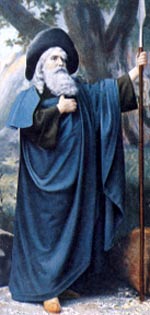 As Mime sits dejected, an aged Wanderer (Wotan) appears. Soon the unwanted guest proposes a battle of wits in which he will forfeit his head should he lose. Mime, though suspicious, agrees, then proceeds to ask the Wanderer three questions: what race lives under the earth (the Nibelungs), on the face of the earth (the giants) and on the cloudy heights (the gods)? The Wanderer answers correctly, then declares that Mime too must answer three questions, to save his own head: what is the race Wotan mistreats but loves most (the Walsungs), what is the sword Siegfried must use if he is to kill the dragon Fafner (Nothung), and who will repair the weapon? When Mime cannot answer the last question, the Wanderer tells him the sword can be forged only by one who has never known fear - and he leaves the gnome's head as bounty to that person.
As Mime sits dejected, an aged Wanderer (Wotan) appears. Soon the unwanted guest proposes a battle of wits in which he will forfeit his head should he lose. Mime, though suspicious, agrees, then proceeds to ask the Wanderer three questions: what race lives under the earth (the Nibelungs), on the face of the earth (the giants) and on the cloudy heights (the gods)? The Wanderer answers correctly, then declares that Mime too must answer three questions, to save his own head: what is the race Wotan mistreats but loves most (the Walsungs), what is the sword Siegfried must use if he is to kill the dragon Fafner (Nothung), and who will repair the weapon? When Mime cannot answer the last question, the Wanderer tells him the sword can be forged only by one who has never known fear - and he leaves the gnome's head as bounty to that person.
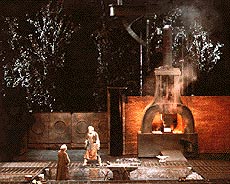 Hearing distant growls, Mime panics, thinking Fafner is coming, but it is only Siegfried, eager to wield his father's sword. Mime tries to find out whether the youth comprehends the meaning of fear. Since he does not, Mime decides to take him to Fafner's lair, where surely he will learn. When Siegfried once more orders Mime to finish Nothung, the Nibelung sobs that he lacks the craft, at which Siegfried repairs the sword himself, launching into a spirited forging song as he works. While the youth toils, Mime plots to get rid of him once the dragon has been killed and the treasure recovered. Siegfried brandishes the finished sword, splits the anvil with it and rushes into the forest.
Hearing distant growls, Mime panics, thinking Fafner is coming, but it is only Siegfried, eager to wield his father's sword. Mime tries to find out whether the youth comprehends the meaning of fear. Since he does not, Mime decides to take him to Fafner's lair, where surely he will learn. When Siegfried once more orders Mime to finish Nothung, the Nibelung sobs that he lacks the craft, at which Siegfried repairs the sword himself, launching into a spirited forging song as he works. While the youth toils, Mime plots to get rid of him once the dragon has been killed and the treasure recovered. Siegfried brandishes the finished sword, splits the anvil with it and rushes into the forest.
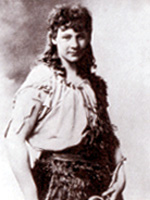 That night, Alberich keeps vigil near Fafner's cave, brooding over his lost treasure, determined to regain the Ring. When the Wanderer approaches, bathed in eerie light, the Nibelung at once recognizes him as Wotan. The god assures him that he no longer cares about the Ring - he is now only an observer of destiny. He adds that it is Mime whom Alberich should fear, for Mime wants the gold and brings a valiant young hero to slay Fafner. The Nibelung is perplexed that his enemy seems to be helping him. Wotan and Alberich rouse the sleeping Fafner to warn him of approaching danger, urging him to surrender the Ring, but Fafner only mumbles he will devour any attacker. God and Nibelung disappear in the shadows.
That night, Alberich keeps vigil near Fafner's cave, brooding over his lost treasure, determined to regain the Ring. When the Wanderer approaches, bathed in eerie light, the Nibelung at once recognizes him as Wotan. The god assures him that he no longer cares about the Ring - he is now only an observer of destiny. He adds that it is Mime whom Alberich should fear, for Mime wants the gold and brings a valiant young hero to slay Fafner. The Nibelung is perplexed that his enemy seems to be helping him. Wotan and Alberich rouse the sleeping Fafner to warn him of approaching danger, urging him to surrender the Ring, but Fafner only mumbles he will devour any attacker. God and Nibelung disappear in the shadows.
As dawn breaks, sunlight penetrates the dense foliage of the forest. Mime enters with Siegfried, showing him Fafner's lair. Dismissed by the youth, the treacherous gnome hobbles off. Siegfried stretches on the ground under a lime tree to rest, enchanted by the murmur of the forest, yearning for the mother he never knew. High in the branches over his head, a Forest Bird warbles a song he wishes he could understand. Cutting a reed and blowing on it, Siegfried tries to imitate the bird.
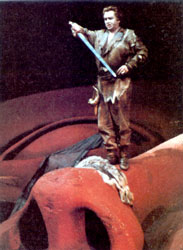 Then he raises his silver hunting horn to his lips, inadvertently awakening Fafner, who rumbles forth from his den. During the ensuing struggle, Siegfried plunges his sword into the monster's heart. Dying, Fafner warns that whoever put Siegfried up to this deed is plotting his death as well. When Siegfried draws Nothung from the beast, his fingers are burned by blood, so he touches them to his lips. The taste of the dragon's blood enables him to understand the language of the Forest Bird, who tells him of the Nibelung hoard, the Tarnhelm and all-powerful Ring. As Siegfried disappears into the cave to inspect the treasure, Mime slinks back, only to be confronted by Alberich. The brothers quarrel over the spoils, withdrawing when Siegfried reappears, carrying proof of his victory - the Tarnhelm, which he fastens to his belt, and the Ring, which he places on his hand. Now the Forest Bird warns Siegfried about Mime, who soon creeps forward, bearing a poisoned drink. Reading the dwarf's true thoughts, the youth loses patience with the Nibelung and kills him, as Alberich's laughter echoes in the distance. While Siegfried rests, lamenting his solitude, the bird tells of a maiden who sleeps on a fire-encircled rock - Brünnhilde, a bride who can be won only by a hero who knows no fear. The youth runs through the forest toward the mountain where she sleeps.
Then he raises his silver hunting horn to his lips, inadvertently awakening Fafner, who rumbles forth from his den. During the ensuing struggle, Siegfried plunges his sword into the monster's heart. Dying, Fafner warns that whoever put Siegfried up to this deed is plotting his death as well. When Siegfried draws Nothung from the beast, his fingers are burned by blood, so he touches them to his lips. The taste of the dragon's blood enables him to understand the language of the Forest Bird, who tells him of the Nibelung hoard, the Tarnhelm and all-powerful Ring. As Siegfried disappears into the cave to inspect the treasure, Mime slinks back, only to be confronted by Alberich. The brothers quarrel over the spoils, withdrawing when Siegfried reappears, carrying proof of his victory - the Tarnhelm, which he fastens to his belt, and the Ring, which he places on his hand. Now the Forest Bird warns Siegfried about Mime, who soon creeps forward, bearing a poisoned drink. Reading the dwarf's true thoughts, the youth loses patience with the Nibelung and kills him, as Alberich's laughter echoes in the distance. While Siegfried rests, lamenting his solitude, the bird tells of a maiden who sleeps on a fire-encircled rock - Brünnhilde, a bride who can be won only by a hero who knows no fear. The youth runs through the forest toward the mountain where she sleeps.
By night, as thunder and lightning threaten a wild mountain gorge, the Wanderer summons Erda from sleep. Concealing his identity, he seeks knowledge of the future. Erda evades the questions, and the god, resigning himself to Valhalla's doom, bequeaths the world to the redemptive power of Brünnhilde's love. When Siegfried ventures into the gorge, the Wanderer encounters his grandson, inquiring with humor about his exploits and the sword he wears. Siegfried responds arrogantly, angering the god, who tries to block his path. Drawing Nothung, the youth splinters the Wanderer's spear with a single stroke. Realizing his power has ended, the deity retrieves the broken pieces, then vanishes as Siegfried scales the mountain.
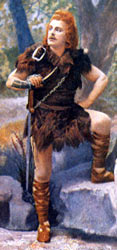 Dawn breaks on the rocky height where Brünnhilde rests. Reaching the summit, Siegfried discovers an armed, sleeping figure, which he assumes to be a man. When he removes the Valkyrie's shield, helmet and breastplate, however, he finds instead the first woman he has ever seen. At last sensing fear, he invokes the spirit of his mother, finally summoning the courage to kiss the maiden's lips. Brünnhilde, roused from her long slumber, slowly realizes she is not dreaming, that Siegfried has come. She hails the sunlight and her return to life. When Siegfried tries to embrace her, she starts in alarm, protesting that earthly passion would destroy her immortality. But she is mortal, no longer a Valkyrie, and womanly ardor soon replaces shame and fear. Throwing herself into Siegfried's arms, she bids farewell to memories of Valhalla, abandoning herself to human love, exulting even in thoughts of death.
Dawn breaks on the rocky height where Brünnhilde rests. Reaching the summit, Siegfried discovers an armed, sleeping figure, which he assumes to be a man. When he removes the Valkyrie's shield, helmet and breastplate, however, he finds instead the first woman he has ever seen. At last sensing fear, he invokes the spirit of his mother, finally summoning the courage to kiss the maiden's lips. Brünnhilde, roused from her long slumber, slowly realizes she is not dreaming, that Siegfried has come. She hails the sunlight and her return to life. When Siegfried tries to embrace her, she starts in alarm, protesting that earthly passion would destroy her immortality. But she is mortal, no longer a Valkyrie, and womanly ardor soon replaces shame and fear. Throwing herself into Siegfried's arms, she bids farewell to memories of Valhalla, abandoning herself to human love, exulting even in thoughts of death.
SIEGFRIED
Act Three Scene Three
SIEGFRIED:
gedehnt mit gepreßtem, drängendem Ausdruck
So saug' ich mir Leben
aus süßesten Lippen,
sollt' ich auch sterbend vergehn!
Er sinkt, wie ersterbend, auf die Schlafende und heftet mit
geschlossenen Augen seine Lippen auf ihren Mund. Brünnhilde schlägt die Augen
auf.
Siegfried fährt auf und bleibt vor ihr stehen.
Brünnhilde richtet sich langsam zum Sitze auf.
Sie begrüßt mit feierlichen Gebärden der erhobenen Arme ihre Rückkehr zur Wahrnehmung der Erde und des Himmels
BRÜNNHILDE:
Heil dir, Sonne!
Heil dir, Licht!
Heil dir, leuchtender Tag!
Lang war mein Schlaf;
ich bin erwacht.
Wer ist der Held, der mich erweckt'?
SIEGFRIED:
von ihrem Blicke und ihrer Stimme feierlich ergriffen, steht wie festgebannt
Durch das Feuer drang ich,
das den Fels umbrann;
ich erbrach dir den festen Helm:
Siegfried bin ich, der dich erweckt'.
BRÜNNHILDE:
hoch aufgerichtet sitzend
Heil euch, Götter!
Heil dir, Welt!
Heil dir, prangende Erde!
Zu End' ist nun mein Schlaf;
erwacht, seh' ich:
Siegfried ist es, der mich erweckt!
SIEGFRIED:
in erhabenste Verzückung ausbrechend
O Heil der Mutter, die mich gebar;
Heil der Erde, die mich genährt!
Daß ich das Aug' erschaut,
das jetzt mir Seligem lacht!
BRÜNNHILDE
mit größter Bewegtheit
O Heil der Mutter, die dich gebar!
Heil der Erde, die dich genährt!
Nur dein Blick durfte mich schau'n,
erwachen durft' ich nur dir!
Beide bleiben voll strahlenden Entzückens in ihren gegenseitigen Anblick verloren
O Siegfried! Siegfried! Seliger Held!
Du Wecker des Lebens, siegendes Licht!
O wüßtest du, Lust der Welt,
wie ich dich je geliebt!
Du warst mein Sinnen,
mein Sorgen du!
Dich Zarten nährt' ich,
noch eh' du gezeugt;
noch eh' du geboren,
barg dich mein Schild:
so lang' lieb' ich dich, Siegfried!
SIEGFRIED:
leise und schüchtern
So starb nicht meine Mutter?
Schlief die minnige nur?
BRÜNNHILDE:
lächelnd, freundlich die Hand nach ihm ausstreckend
Du wonniges Kind!
Deine Mutter kehrt dir nicht wieder.
Du selbst bin ich,
wenn du mich Selige liebst.
Was du nicht weißt,
weiß ich für dich;
doch wissend bin ich
nur - weil ich dich liebe!
O Siegfried! Siegfried! Siegendes Licht!
Dich liebt' ich immer;
denn mir allein erdünkte Wotans Gedanke.
Der Gedanke, den ich nie nennen durfte;
den ich nicht dachte, sondern nur fühlte;
für den ich focht, kämpfte und stritt;
für den ich trotzte dem, der ihn dachte;
für den ich büßte, Strafe mich band,
weil ich nicht ihn dachte und nur empfand!
Denn der Gedanke - dürftest du's lösen! -
mir war er nur Liebe zu dir!
SIEGFRIED:
Wie Wunder tönt, was wonnig du singst;
doch dunkel dünkt mich der Sinn.
Deines Auges Leuchten seh' ich licht;
deines Atems Wehen fühl' ich warm;
deiner Stimme Singen hör' ich süß:
doch was du singend mir sagst,
staunend versteh' ich's nicht.
Nicht kann ich das Ferne sinnig erfassen,
wenn alle Sinne dich nur sehen und fühlen!
Mit banger Furcht fesselst du mich:
du Einz'ge hast ihre Angst mich gelehrt.
Den du gebunden in mächtigen Banden,
birg meinen Mut mir nicht mehr!
Er verweilt in großer Aufregung, sehnsuchtsvollen Blick auf sie heftend
|











